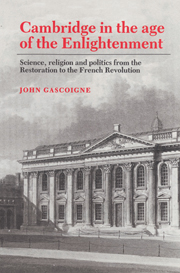 Cambridge in the Age of the Enlightenment
Cambridge in the Age of the Enlightenment Published online by Cambridge University Press: 24 August 2009
The establishment of Newtonian natural philosophy as the foundation of undergraduate studies at Cambridge had owed much to the conviction of Newton's early clerical disciples that his system of natural philosophy was an invaluable ally to the cause of Christian apologetics. Cambridge, then, had been particularly important in fostering the ‘holy alliance’ between Anglicanism and Newtonianism which had been one of the characteristics of the Hanoverian Church and which had helped to diminish the accusation of clerical obscurantism which was so marked a feature of the French Enlightenment. As Cannon writes: ‘how different the English Enlightenment was from the French. Sheltered under Newton's great name, science and religion had developed a firm alliance in England symbolized by that very British person, the scientific parson of the Anglican Church’ (S. F. Cannon, 1978: 2).
Yet once Newtonian natural philosophy became securely established in the university's curriculum these apologetical motives were increasingly forgotten. As so often with institutions, a new impulse is gradually translated into established routines which only faintly bear the imprint of the intentions of the reformers. In Cambridge's case the Newtonian heritage was, by the late eighteenth century, increasingly narrowed to those aspects which could be most conveniently combined with the university's pedagogical processes which were increasingly shaped by the Senate House examination (after 1824 known as the mathematical tripos).
To save this book to your Kindle, first ensure no-reply@cambridge.org is added to your Approved Personal Document E-mail List under your Personal Document Settings on the Manage Your Content and Devices page of your Amazon account. Then enter the ‘name’ part of your Kindle email address below. Find out more about saving to your Kindle.
Note you can select to save to either the @free.kindle.com or @kindle.com variations. ‘@free.kindle.com’ emails are free but can only be saved to your device when it is connected to wi-fi. ‘@kindle.com’ emails can be delivered even when you are not connected to wi-fi, but note that service fees apply.
Find out more about the Kindle Personal Document Service.
To save content items to your account, please confirm that you agree to abide by our usage policies. If this is the first time you use this feature, you will be asked to authorise Cambridge Core to connect with your account. Find out more about saving content to Dropbox.
To save content items to your account, please confirm that you agree to abide by our usage policies. If this is the first time you use this feature, you will be asked to authorise Cambridge Core to connect with your account. Find out more about saving content to Google Drive.